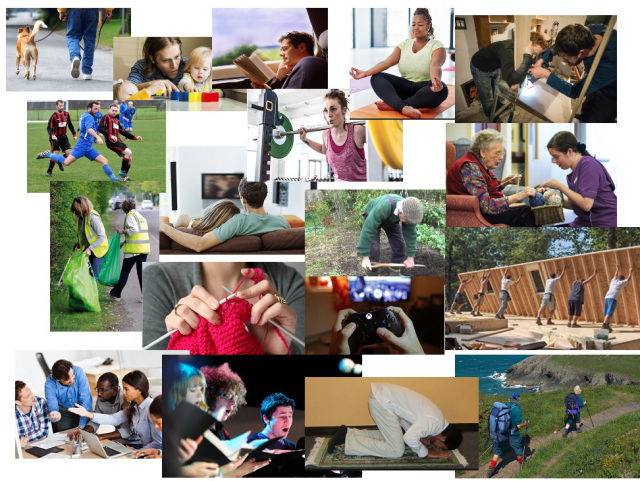As a behavioural psychologist, I am challenged by Tim Jackson’s book “Prosperity without Growth“. Living on a finite planet, how do we find ways to flourish in a world of less economic growth and less material consumption? At the same time, if AI and robotics continue to replace jobs at all levels in society, could a Universal Basic Income paid to every UK citizen enable enjoyable, meaningful lives which contributed to society in other ways than by traditional paid employment?
Asking people how they might behave or feel in an imagined future is tough. They don’t know and nor do we. But we can get clues from studying how people behave now and why that is and use that to understand how those behaviours might either be affected by or themselves affect this rather different future we face.
I conducted an online survey of 325 UK residents roughly matching UK demographic profiles on gender, age and personal income. I invited them to describe recent activities (either in their paid work or leisure time) which they found enjoyable or meaningful or they felt made a difference and why they felt that way. I explored: demographic differences, how much the activities cost them, environmental impact, dependence on material consumption and any economic benefit or contribution to social capital. I also asked them whether they had recently engaged in any of the following socio-cultural activities: creating, composing or designing, craft or construction, learning or discovering, collaborating, volunteering or helping and being active outdoors. The list was chosen to reflect the sectors of care, craft, creativity and culture suggested by Tim Jackson as a possible basis for a new kind of sustainable prosperity. Finally, respondents were asked to rate how much they enjoyed their lives, found them meaningful, felt valued and felt able to make a difference or change things.
The 900 descriptions of enjoyable, meaningful and difference-making activities were diverse but refreshingly simple in nature: walking the dog, gardening, playing with the kids, listening to music, making something, helping a neighbour, attending Church, reading a book, watching TV or singing in a choir. Shopping was rarely mentioned. Most activities involved little or no material consumption, had little or no environmental impact and were mostly free or cost very little. Levels of personal income had little effect on the choice of activities with the exception of some foreign holidays and major home improvements.

Examples of the kinds of activities described
Only 5% of enjoyable activities, 6% of meaningful activities and 19% of difference making activities happened as part of their paid work. Worryingly, this may reflect the preponderance today of “bullshit jobs” as David Graeber refers to them. The activities described make a small but steady economic contribution via services such as gyms, instructors and guides, cinemas, entertainment events, restaurants and media generators such as digital content, books, music and films. These are industries which rely heavily on either shared facilities or human creativity or personal interaction.
While everyone described something they enjoyed, 11% of people couldn’t think of a meaningful activity. Those that did described helping others, doing things with their family and learning or experiencing new things. Only 1 in 5 of these activities contributed directly to social capital but they were heavily reliant on the social capital generated by others such as local clubs and social or sports events.
25% of people couldn’t think of something they had done recently which they felt made a difference or had an effect- whether in or outside of their paid work. The activities named ranged from helping others to home improvements or doing things together with their family as well as 19% connected to work. The work ones varied from analysing statistical data to managing funerals! Helping others outside of work again relied heavily on the existence of non-profit, social organisations such as local charities, clubs, schools and churches.
When asked about their engagement in socio-cultural activities reflecting creativity, craft, culture and care – around half the respondents had not engaged in 5 out of the 8 listed in recent months. They were least likely to have engaged in creative/composing/designing, craft or construction, learning or developing a new skill, collaborating with others or volunteering. They were most likely to have been active outdoors and to have helped a non family member. Although few had engaged in any of these activities as part of their paid work, those in paid work were much more likely to engage with such activities in their leisure time than those not in paid work or retired (who arguably had more leisure time). I would like to understand this difference better.
In terms of overall well-being, people rated their lives as slightly higher on enjoyment than meaningfulness and lower on making a difference and feeling valued. Overall ratings increased with personal income up to £51k and then leveled off.
3 factors made a significant difference to people’s ratings on meaningfulness, value and sense of making a difference. These were whether they were graduates, whether they were a member of a social group, club or organisation and whether they had any religious faith or other spiritual practice. And these 3 factors were themselves cross correlated. Other levels of educational attainment (GCSE, A Levels, Diploma) made little difference. Further analysis showed that graduates were much more likely than non-graduates to have engaged in every one of the socio-cultural activities listed (mostly in their leisure time) and the greater the engagement in such activities, the higher their overall well-being ratings.
So, what do the survey findings suggest about our ability to prosper enjoyably and meaningfully in a world of less economic growth, less consumption and less paid work?
People readily engage in day to day activities that they enjoy and find meaningful and which cost them very little, consume very little and have minimal environmental impact. It suggests our individual prosperity may be less tied to our consumerist lifestyles than is sometimes thought and less than our government is relying on to grow the economy. This fits with other findings that the population were happier in the 1950’s than they are now.
What is less clear is how well we would prosper as individuals and as a society if everyone was financially provided for via a Universal Basic Income but few were engaged in paid employment. The enjoyable and meaningful activities which people described are ones they could and would still happily engage in. But few of these could be classed as “occupational” in the sense of purposefully engaging one’s skills and interests throughout each day, generating respect from others and giving people the sense of making a valued contribution to society.
In particular, activities associated with care, craft, creativity and culture weren’t practised with any frequency by half the surveyed population. These are activities which can become “occupations” in their own right in the sense of providing ongoing meaning, skill development and personal fulfillment as well as contributing to social capital and new kinds of economic growth.
The fact that graduates were much more likely than non-graduates to engage in such socio-cultural activities, as well as being more actively involved in clubs and voluntary organisations, does raise questions – especially as care, craft, creativity and culture are certainly not the focus of our current educational systems. My hunch is that it’s less about the academic training of graduates and more about the whole social experience of attending university with the opportunity to create new social networks, try new interests and even identities. Also one is surrounded by several hundred different societies, clubs and interest groups all run by volunteers like yourself.
Alternatively, it could be that the particular socio-cultural activities we named actually reflect a distorted graduate-centric view of prosperity. This graduate is worried that could be the case and would welcome other views.
Finally, I am uncomfortably aware that the present study was limited to people in the UK who are fortunate to have enough to meet their daily needs of warmth, food and shelter in life and so have arguably the luxury of considering how enjoyable and meaningful their lives are. I am sorry that we live in a wealthy country where that is the case.
I hope the questions and findings described might trigger conversations about untangling economic growth, consumerism and jobs from human prosperity.
A copy of the full research report can be read here.
Advertisements Share this:





